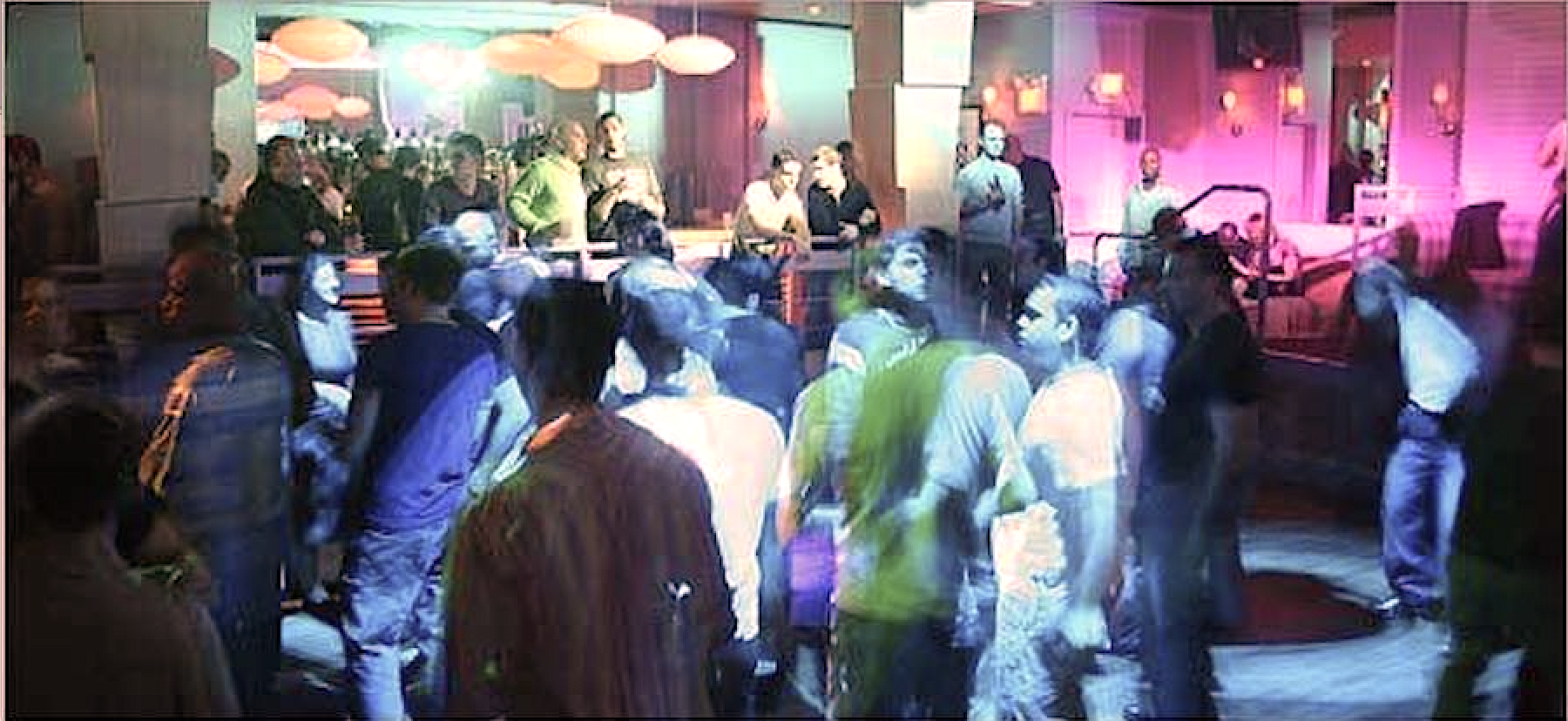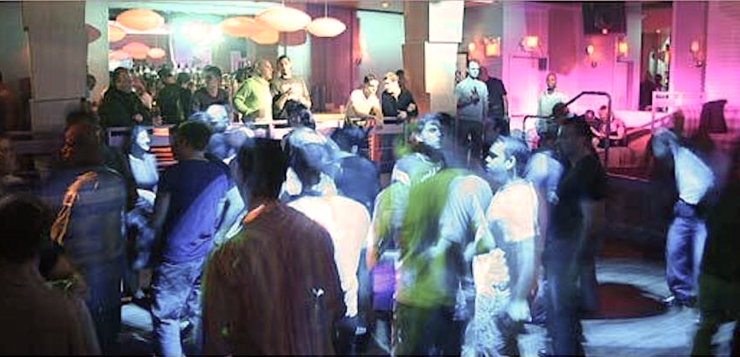TO ANY LGBT PERSON who isn’t accepted enough in their formative years, here’s the drill: you simply wait it out, and eventually find some real family—in the community, in the nightlife, or simply in the world of like-minded adults. That’s when you’ll emerge into your complete acceptance, leading to a worry-free rest of your life spent being validated by your loving peers. So says the fairy tale. But what happens when the new family you enter into turns out to be as flawed as your old one? These are people, after all, in all their beautiful, fabulous fallibility, and just because they say they accept you for being queer doesn’t necessarily mean they really do—not when you’re a particular type of queer person.
Self-made “families” provide support and comfort for their members, but they can also be riddled with inequalities, since oppressed groups have been known to mirror the outside world and oppress you from within. Your new “family by choice” can prove to be nearly as dysfunctional as the folks you had no say in selecting, the ones who did a well-intentioned job of raising you because the responsibility landed in their laps, so they muddled through the whole process.
My parents loved me a great deal, but way back in residential Brooklyn in the 1960s, having a gay son was not exactly what they’d bargained for. Dad thought gays were perverts, and I’m pretty sure my devout Mom said a lot of silent prayers wishing I wouldn’t turn out the way I appeared to be heading. Both ended up coming around beautifully, but until then I sought acceptance from other families that I was sure would sweep me into their midst and make me feel whole.
Wrong! Going to gay bars in the 1970s—when those places were primarily meccas for sex pickups—was a rude awakening, because I proved to be as invisible as a facemask at Mar-a-Lago. I was young and nubile, but since I was awkward-looking and not exactly built for show, I wasn’t anyone’s idea of a dream date, and I found it hard to find someone to talk to that would even talk back. Some family! As comedian-actor Guy Branum tweeted this past March: “The gay community is full of civil rights advocates who would not speak to me in a club.”

In mixed nightspots, I was certain I’d get a warmer greeting, but I was similarly ignored—at least until I started singing with a band in 1980 and later, in 1984, got a weekly column in The Village Voice. I suddenly had the power to give people bold-faced mentions, and I noticed that my new visibility and influence made me wildly alluring. (I’d gotten a whiff of this lesson back in high school, when I was shy and unnoticed until winning medals and participating in creative activities. Voilà!—success made me desirable.) All at once, I was a cherished part of the downtown family, and, although I ate it up, I was savvy enough to realize the hollowness of my triumph. I knew that, by contrast, my biological family made me the center of their world without any hope that I’d give them a write-up or run their photo somewhere. Something about their damaged but sincere concern for me was more authentic than this new “family” that appreciated my quirks and embraced my gayness, but probably wouldn’t even say hello if I couldn’t add to their media portfolio or wasn’t getting publicity myself.
Mind you, I was stimulated by the anything-goes spirit of the clubs, happy that you could carry on with a potted plant on your head if you so chose, without censure or mockery. As I’ve written before, the face-to-face connection with other queer people was invaluable and provided an ongoing opportunity to socialize, network, and exchange ideas. It was a head-spinning way to feel part of something, a place where no one made fun of you for the traits that used to get you bullied in the school cafeteria. Either out of open-mindedness or simply an obsessive attention to their own outfits, these people didn’t judge your exterior the way less evolved communities did. As my notoriety grew, so did my confidence, allowing me to be more sociable, which netted way better results than I’d had back in the pickup bars. People actually talked back.
Alas, the nightlife “family” members favor playmates who can give them what they’re looking for at the moment, whether it be idle chitchat, drugs, free drink tickets, flattery, sex, a dancing partner, or some ink in the newspaper. Clubs are hedonistic pleasure domes populated with people striving for enjoyment and approbation, and the result became a glittery microcosm of show biz, full of hopefuls and the hopeless, with me as a combination of MGM cofounder Louis B. Mayer and gossip columnist Walter Winchell. Amidst the revelry, dark moments seeped in to remind me that I was still the pink sheep of the family. One night at a late club in the late 1980s, the crowd had thinned out and I was desperate to communicate with anyone rather than skulk home alone. I brightened when I saw two of my two best club friends talking to each other on the dance floor, so I ran over to them, anxious to join in and have a Kiki, as we used to call it (a gossip session). But they kept burrowing into each other with their eyes, having some kind of happy, exclusive chat, while clearly sending me the message to go away. They didn’t even care that I could give them bold-faced mentions! This brought back painful childhood memories of being shut out of conversations, and drove home the reality that a family is not going to provide everything for you every time you need it.
But who was I to whine? My cis white male privilege granted me way better treatment than was received by lesbians (about whom gay men often got squeamish), people of color (whom most NYC gay bars didn’t reach out to, and some had dress codes designed to exclude), and trans folks, who weren’t always so treasured by the L’s, G’s, and B’s. A pecking order has always marred the community, which has a history of ostracizing drag queens and other flamboyant queers—until RuPaul’s Drag Race made them international stars, and now we can’t get enough of them. Rather than pulling the cart, sometimes we are the cart.
Fortunately, that was not the case in 1987, when the AIDS activist group ACT UP was formed, the community realizing it had to save its own ass because the big guns in charge were turning a blind eye to our devastating health crisis. Going to my first ACT UP meeting, I learned what family really was all about. Insanely enough, I actually thought I’d sweep in there and get gushed over and photographed as if at a nightclub opening. Once the reality hit that this was serious business and everyone there was a star (for their righteous furor and percolating intellectual energy), it sank in that we were a powerful group, one that brought together various strains of the community, including lesbians, for a common cause. A family under extreme duress, desperate to get governmental and media organizations to pay attention to the horrors of AIDS. ACT UP managed to channel everyone’s anger, grief, and fear and apply it to well-thought-out actions that were geared to grab headlines and get results. As we took to the streets to scream at the powers that be, I was proud to call these people my family.
Since then, I’ve attended innumerable rallies and marches, been on panel discussions at the LGBT Center, and engaged in a lot of other projects that have made me feel connected to the community. My message to young queers in the heartland has long been: “You’re not alone and you can always drop by New York and find some semblance of a family. It’s not a perfect family, but there are definitely some people here who used to be as afraid as you are now, and they might be able to offer a helping hand, a shoulder to cry on, and I’ll stop with the clichés.”
I’ve found that the ultimate expression of this process is practiced by queer people in the creative arts, who have turned “family” into an art form. As they routinely switch venues and go from a TV show to a play to a concert tour and back again, they forge a series of alliances that help ground them and from which they hope to receive support. I’m reminded of this year’s Oscar-winning film Nomadland, about a community of roamers who never say “Goodbye,” because they could very well run into each other “down the road” in the future. For me, being part of imperfect families has been better than not having any at all, as long as we work from within these groups to improve the dynamics of support. But at the risk of sounding like a Whitney Houston song, I’ve found that the best bet of all is to find the strongest connections that you can while basically taking care of yourself. As my own father, brother, uncle, and son, I’m emotionally equipped for the long haul.
Michael Musto is a longtime columnist and commentator who has written four books, includingDowntown (1986) andFork on the Left, Knife in the Back (2014).






